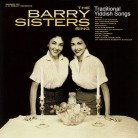15.03.2012
The Barry Sisters. The jazz legend about bagels.

Once upon a time there was a Jew called Bagelman. With the surname coming from the nature of his, he lived in Podol neighbourhood in Kiev. Our Jew indeed ran the same business as his ancestors had been running for centuries. He was a “bublichnik” which means in case you would have liked to taste the best bagel in the city, you had not choice but to visit Bagelman’s bakery.
At the same place and also once upon a time, there was another Jew – Jacob Petrovich Davidov. He also lived somewhere in Podol neighbourhood and was the master of all the journalistic genres: from political and satirical reviews to jokes and songs . In 1926 he wrote the song “bublichki”, which at once rolled up to America. There it was translated into Yiddish and suddenly acquired entirely different sense and sentimental character.
Meanwhile, searching for the best life one of Bagelman’ s sons ran away from politically concerned Kiev . He found his “corner” and a wife in the Jewish quarter of Manhattan where the prevailing population were native Russians. After a while our Bagelman became a grandfather of two sweet girls – Clara and Minnie Bagelman.
 In the family spoke only in Yiddish. Other languages were simply not required in East-side neighbourhood. Once, on the Jewish radio, little Klara heard an easy-to-remember song, called “Bejgelah” (or “bublichki”). It was executed by children. Klara’s mother heard it too and thought in a manner of all the good Jewish mothers do: “Is it that my girls are less talented?” She grabbed Klara and dragged her off to the Jewish radio.
In the family spoke only in Yiddish. Other languages were simply not required in East-side neighbourhood. Once, on the Jewish radio, little Klara heard an easy-to-remember song, called “Bejgelah” (or “bublichki”). It was executed by children. Klara’s mother heard it too and thought in a manner of all the good Jewish mothers do: “Is it that my girls are less talented?” She grabbed Klara and dragged her off to the Jewish radio.
The debut of little Klara Bejgelman with “Papirossen” was just a first step of the world-famous Jazz duet beginning. There was a long story in between, but their mother always was the tireless engine, who was inspiring, encouraging and supporting us, – recalls 88-years old Claire.
Later on, the sisters changed their names into more “American” ones. Clara became Clare, Minnie changed into Merna. The famous “Barry” was created by Minnie.
“We were not embarrassed by our names, – says Barry. Never embarrassed. It was just better for show business. We knew so many entertainers who did it back then that we thought it was just a good business decision. It wasn’t about culture at all, just business.”
The Barry Sisters never had some particular musical education. According to Clare’s memories, the genius idea of the marvelous “Sister’s Third” came across the mind of Abraham Elshtejn, a talented musician and composer. At their barely first meeting he told:
«Oh, I have an idea! Let Clare sing the melody, as she has a higher voice, and Merna will take the harmony ». This is how the matchless and the purest “Sister’s Third” was born.
“People told us that we had perfect harmony, – says Barry. But to be honest, we didn’t know what harmony meant! We had no training, no schooling in this type of thing. There is a Yiddish word beshert,which means meant to be. I always say, it was beshert that we would sing like that.”








Wow, thanks for this great report!!
http://www.elenavenskaya.com/index.php?option=com_blog&view=comments&pid=197083&Itemid=0
cheap beats headphones embody the actual optimum additionally to perfect expression, well value with it’s salt just because well-liked wireless earbuds [url=http://cheapbeatsbydre1.weebly.com/]cheap beats[/url] provide deep bass response and sound over the spectrum. That’s because people use no amplification or simply noise cancellation circuitry which adds other frequencies, hues the sound, or compromises striped bass response.
I don¡¯t know how you do this but I can¡¯t stop reading.
I enjoy, lead to I discovered just what I was having a look for. You¡¯ve ended my four day lengthy hunt! God Bless you man. Have a nice day. Bye
Visit the websites below for more interesting information and services to try
You raise many queries in my thoughts; you wrote an excellent article, but this articlee is also thought provoking, and I am going to need to ponder it a bit more; I will be back soon.
Chad The way in which My spouse and i look into the write-up they have a twelve megabit link. NTL maybe?
Healing’s Dragon…
to find matters to further improve my web page!I suppose its ok to help make usage of a couple of of your ideas!!…
This content is well researched and written with a lot of interesting points and unique content. Please keep up the good work on this site. Thank you for making your article so clear and engaging.